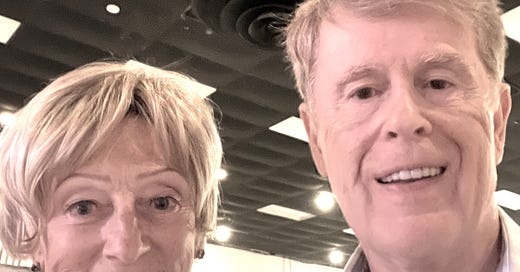'ASAdvocate' Harry Newman: Fighting Online for Truth, Justice and the AS Way
Look! Up on the internet! It's a bird! It's a plane! It's ASAdvocate!
By Howard Wolinsky
On a daily basis, veteran active surveillance (AS) patient and caped crusader Harry Newman patrols social media for bad information about AS to correct.
He’s like an AS Superman, plying the information highways and byways in the dark corners of the internet, where the Lex Luthors, Doomsdays, and the Ultramans try to disrupt truth, justice, and increasingly the American way of managing prostate cancer with AS.
Harry’s secret identity online has been “ASAdvocate” ever since he started engaging with AS trolls on social media in 2014. (He uses his real name on Facebook.)
His superpower is truth and science.
Harry, 78, of Alexandria, Virginia, was diagnosed with low-risk prostate cancer in 2009 and has been on AS at Johns Hopkins ever since. He has been defending the honor of AS from the misinformation spread in some online support groups.
(Harry Newman and his partner Marni. They met in 2011, on a cruise between Agadir and Casablanca. They’ve been to all seven continents together and have more places on their bucket list. Go, Harry. Go, Marni. Even superheroes need a break now and again.)
It’s a jungle out there.
Could his nemeses be AI bots? Maybe elderly Russian counter-intelligence agents with a grudge and an aggravating case of prostatitis and enlarged prostates?
Maybe it’s just a bunch of guys who don’t understand what AS is and think that radical prostatectomies are the solution to their low-risk cancers and are oblivious to the risks of potentially experiencing impotence and incontinence.
Their choice of course but they should be careful about spreading incorrect information.
Harry engages in at least one dog fight daily while making his rounds in the internet Metropolis.
One guy told Harry that AS is another word for suicide. Them's words that Harry answers with a big dose of truthiness and links to research. We’d expect no less from a retired IT consultant, who had been under contract to several federal agencies, programming for the U. S. Congress and the U. S. Treasury.
For the record, survival outcomes with AS, surgery and radiation are about the same. The main difference is AS patients are not at risk of those quality-of-life issues. They’re monitored to detect any change in their lesions.
Other critics argue that prostatectomies are the most popular approach to deal with low-risk prostate cancer. Untrue.
This is not a popularity contest, boys and girls.
Again, some patients may decide surgery or radiation is a better choice for them. We won’t argue with them and try to convert them to AS.
To paraphrase the Great Ali G, we should “respek” one another. On the internet, it’s too easy to forget we are dealing with other humans not robots.
We can agree to disagree and don’t need to try to humiliate each other. Civility, people. That’s Harry’s way.
AS can be a hard to understand. It’s a hard sell many times. You’re learning to live with a “cancer” and not dying from it. It’s not business as usual.
But the fact is AS is on the rise and surgery is in decline.
Check out this chart from the American Urological Association AQUA database.
The big three management approaches for low-risk prostate cancer were in a dead heat in 2014 when AUA launched its database: There was a 29.7% market share for radical prostatectomy, 28.4% for external beam radiation, and 26.5% for AS.
AS passed its competitors, reaching 59.6% in 2021 compared with 20.9% for radiation and 15.8% for surgery
(ASAdvocate in action.)
“I have countered hundreds, maybe a thousand surgery advocates since joining my first online support forum in 2014. I estimate that I’ve posted about 15,000 comments on about 13 or 14 sites/groups since then. Also, in-person and Zoom groups,” Harry said.
Harry said the great majority of his comments are informational and supported either by peer-reviewed studies or personal experience.
He added, “But, quite often, some surgery survivors will make adamant and irresponsible comments about AS, and I have cut-and-paste rebuttals to post in reply. Usually, I cite studies published in The Journal of the American Medical Association, or by the AUA, to challenge their opinions."
“Luckily, they are not as numerous as in 2014, when I was often the only participant defending AS. Many of the surgery guys who trashed AS then, now accept it as standard for Gleason 6 men. But, they’ve been around for a long time in these discussions. Today, almost all of my run-ins are with surgery guys just starting to participate in support groups. Maybe some of them will come around in time.”
Harry said he is not alone in the trenches of truth anymore. Other AS patients are starting to speak up in these online groups.
He said: “I have many AS allies, you included, but I usually engage in online comments on my own. Oh yes, things are very different now than in 2014. Other AS guys often join in with their comments and citations.”
He said patients who have undergone surgery are the ones who most vocally attack AS.
“It’s always the surgery guys,” he said. “You know, Howard, in almost ten years of defending AS on various forums, I have never encountered arguments from men who had treatments other than surgery. None. They are the only skeptics, although AS seems to be much less contested now than a decade ago.”
I suspect many
“surgery guys” may be experiencing “decisional regret”. That’s when patients have second thoughts on their choice of a strategy to manage their cancer.
Harry puts it this way: “I can't help but think that some of them have a ‘misery loves company’ mindset. Of course, I try to keep things civil, and don't post my opinions like that online.”
That’s the best way, Harry. Respek.
Deadline coming Feb. 15 on awards for AS advocacy
By Howard Wolinsky
Active Surveillance Patients International, founded in 2017 as the first international support and education group dedicated to Active Surveillance (AS), has announced an expanded awards program to recognize patients, doctors, and programs that have advanced the cause of AS - close monitoring of prostate cancer.
ASPI is soliciting your nominations from the AS community and beyond for the awards,
ASPI is continuing the Dr. Gerald Chodak Active Surveillance Pioneer Award for medical professionals who advanced the cause of AS. This is the second year ASPI will present this award.
Laurence Klotz, MD, the so-called “father of AS,” credited with naming the management technique, was the first recipient of the Chodak Award last year.
Klotz is a urology professor at the University of Toronto and Chief, Division of Urology, Sunnybrook Health Sciences Center.
Chodak, a urology professor at the University of Chicago Pritzker School of Medicine, provided the seminal thinking for the AS approach. He created the Us TOO support organization, which merged in 2021 with ZERO, and was ASPI’s first medical adviser.
Chodak died in 2019 from an aneurysm at age 72. (His obit: https://www.medpagetoday.com/special-reports/apatientsjourney/82547)
Among his many avocations, including tango and golf, Chodak was a glassblower.
Robin Chodak, Gerry’s widow, endorsed the awards program and donated a piece of her late husband’s art, a decorative glass bowl emphasizing blue, the designated color for prostate cancer.
(Dr. Klotz spoke about Dr. Chodak and the future of AS at the 2022 Awards virtual ceremony.)
Klotz received the bowl in honor of Chodak and the award.
(Note Dr. Klotz and the bowl that Dr. Chodak made.)
ASPI will present two new awards in 2023:
--The ASPI AS Advocacy Award. This award goes to a layperson who has made a significant contribution toward the advance of AS.
--ASPI AS Special Award. This award will go to a group of doctors or patients who have made a special contribution to AS.
Please send any nominations to The ASPI Awards Committee at mlichty@aspatients.org by Feb 15.
The awards committee includes: Robin Chodak, Dr. Chodak’s widow, a grief coach and author; Mark Lichty, co-founder and chair of ASPI; Howard Wolinsky, ASPI co-founder and editor of TheActiveSurveillor.com newsletter; Paul Schellhammer, MD, an advanced prostate cancer survivor and past president of the American Urological Association; Ericka Johnson, PhD, a social scientist at Linköping University, Sweden, and author of “A Cultural Biography of the Prostate”; James Schraidt, a patient advocate, former chairman of Us TOO and now a board member for ZERO: The End of Prostate Cancer.
ASPI webinar on Feb. 25: ‘Transitioning to Treatment’
Patients quit active surveillance (AS) for a variety of reasons.
One reason is patients’s disease “progresses” They’re found in a biopsy to have more advanced cancers—Gleason 4+3 or higher and the time has come to move on from active surveillance to active treatment, radiation or radical prostatectomies.
Active Surveillance Patients International is holding a webinar on “transitioning” from AS to aggressive treatments.
The session, which will be followed by a question-and-answer session, will be held at 12 p.m. Eastern on Saturday, February 25. To register, click here: https://bit.ly/3JUlRXq
For more details: https://bit.ly/3K0xPOW
The program will feature three patients who made “the transition”: Thrainn Thorvaldsson, an ASPI co-founder from Reykjavik, Iceland, and a pioneer in AS support; Joe Gallo, an ASPI board member from Philadelphia, Pennsylvania; and Govinda Ramakrishna, who divides his time between Canada and India.
Mark Lichty, ASPI chair and co-founder, said: “Each of us has gone through, and continues on, the prostate cancer journey with a different story. The latest estimate in the United States is that approximately 50% of men on AS need to transition for various reasons in the five years following diagnosis.
“Isn’t that the way with prostate cancer… it is a long, winding, and unpredictable road —a divergent experience for all of us. Every one of you has your own narrative.”







